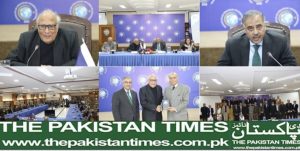ISSI hosts Shoaib Sultan Khan on poverty alleviation at its “Thought Leaders Forum”

The Institute of Strategic Studies Islamabad( ISSI) hosted its rearmost ‘ Allowed Leaders Forum ’( TLF) under the title, “ Poverty relief and the part of pastoral Support Program. ”Mr. Shoaib Sultan Khan, Chairman National Rural Support Program( NRSP), Pakistan was the Distinguished Speaker. In her welcome reflections,Dr. Neelum Nigar, Director of the Centre for Strategic Perspectives( CSP), mentioned that under the TLF, ISSI acknowledges and pays homage to individualities esteemed as authoritative voices in specific fields. These individualities have played a pivotal part in shaping perspectives, impacting opinions, and driving invention within their separate disciplines in Pakistan. She added thatMr. Shoaib Sultan Khan stands as a testament to this spirit of allowed
leadership, and ISSI is privileged to have him partake his perceptivity on this platform. DG ISSI Ambassador Sohail Mahmood, in his welcome reflections, paid rich paeans toMr. Shoaib Sultan Khan’s vision, transformational leadership, and outstanding donation to sweats for poverty reduction in Pakistan and the region, including in India, through community participation. He added thatMr. Shoaib Sultan Khan’s life-long work had made a difference in the lives of millions and was properly recognised in Pakistan and internationally. Ambassador Sohial Mahmood noted that Pakistan has made significant strides in reducing absolute poverty, with rates dropping from61.6 in 1998- 99 to21.5 in 2021- 22. still, multidimensional poverty remains high at 39, pressing privation in health, education, and standard of living. Recent events, including the COVID- 19 epidemic and cataracts, have aggravated these challenges, particularly affecting pastoral communities where musts are scarce. Shoaib Sultan Khan has been necessary in addressing challenges and uplifting pastoral communities, particularly through his leadership in the pastoral Support Program. Since 1982, he has played a transformative part in colorful poignant programs across Pakistan, India, and South Asia, appreciatively impacting millions of lives. Shoaib Sultan Khan, while slipping light on poverty relief and the part of pastoral support programs, emphasized that Pakistan’s pastoral support programs are among the oldest in the region. These programs are extensively conceded for their success and have served as a model and alleviation for analogous enterprise in South Asia, including India. still, regrettably, programs inspired by Pakistan’s pastoral support model have shown lesser success over time. He emphasized that the pursuit of poverty eradication should be a participated political docket, serving as a unifying force rather than a source of division within regions. It’s a common thing that has the implicit to foster collaboration and solidarity across different geographical areas, emphasizing the collaborative responsibility to address and exclude socio- profitable difference.
Mr. Shoaib Sultan Khan further illustrated multiple factors that contribute to the success of similar programs including long- term political commitment, poverty eradication as a common political docket, political support and power, sustained governmental support, institutional development, invention and adaption, and participation of women. During his reflections,Mr. Shoaib Sultan Khan brought attention to four essential rudiments of the success of a pastoral support program;( i) the amenability of the homes to organize and enable their eventuality( ii) a competent community leader with social rallying vision;( iii) professional, devoted and married support association; and( iv) vacuity and commitment of coffers. He further said that the uninterrupted success of pastoral support programs hinges on the active engagement of homes, encouraging them to embrace a cooperative mindset for sustainable development. During the interactive session, a wide range of subjects dealing with pastoral support programs in Pakistan was bandied. motifs including sustainable development of programs, political transitioning, employing people’s implicit, addition of women, data sharing among departments, political will, and digitalization of the program came under discussion. It was emphasized that the pastoral support program had proven its applicability and efficacity over time and that this vision remained applicable and sustainable, now and for the future. The Forum was attended by a large number of serving and former civil retainers, academics, suppose tank experts, development interpreters, scholars, and members of civil society and the media. Towards the end, Ambassador Khalid Mahmood, Chairman, BoG ISSI, presented ISSI’s momento to the Distinguished Speaker.
Sub-Editor: Arslan Majeed